Belonging and Inclusion Station

Welcome
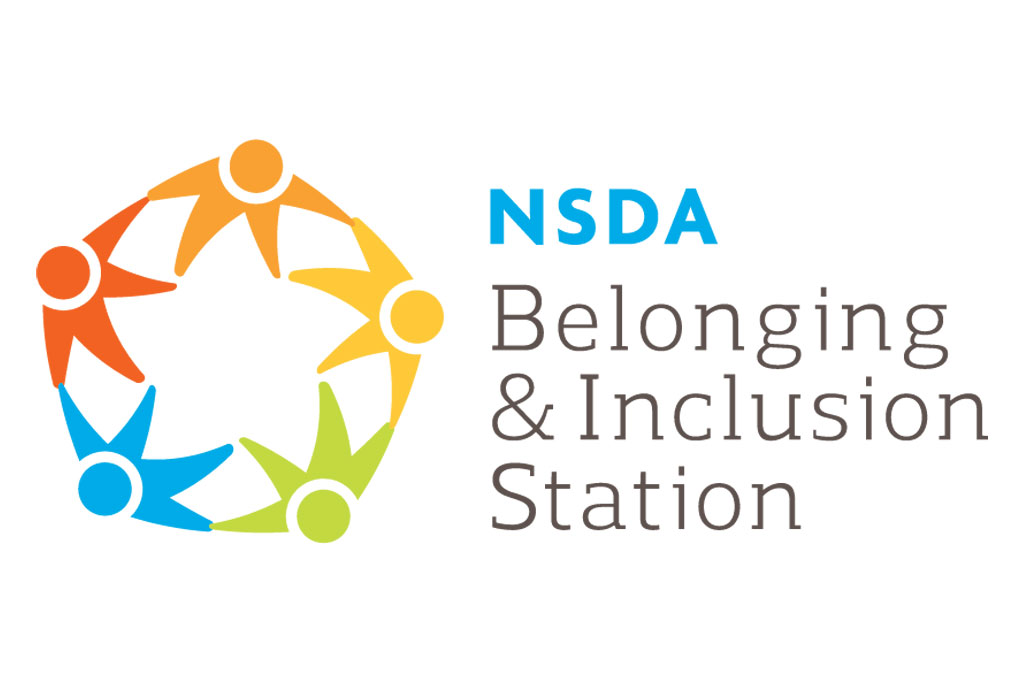
The NSDA is committed to fostering a tournament environment where all members feel included and safe. The Belonging and Inclusion Station (BIS) provides interpersonal support to those who feel excluded and helps uphold the NSDA Harassment and Discrimination Policy. Rooted in the principles of teaching, learning, and healing, the BIS addresses concerns through dialogue and education, reserving corrective measures for situations where education alone cannot resolve an issue.

Reasons to visit the BIS include:
- An individual makes an inappropriate joke.
- A really powerful speech (that violates no rules) triggers emotions in a contestant or judge, and they need space to process their feelings.
- An individual feels overwhelmed or alone and needs a listening ear or encouragement.
- A contestant is rude or unkind to another contestant.
What the BIS is not…
- A punishment-focused process
- A place to revisit past grievances unrelated to the current tournament
- A space to silence participants
- A tool to empower or disempower individuals based on political or social ideologies
- A loophole around tournament rules or guidelines
DID YOU KNOW? You can also visit the BIS to share how you’re feeling about your tournament experience. For example, if you didn’t advance to elimination rounds and your season has ended, the BIS provides a supportive space to process and unpack those emotions.
Learn more about our purpose »
Explore the BIS Development and Implementation Guide for answers, resources, and everything you need to get started.
Philosophy of the BIS
BIS Pillars
TEACHING Belonging and Inclusion Advocates help visitors understand how exclusion, harassment, and discrimination can negatively impact a person’s tournament experience.
LEARNING The BIS addresses inappropriate behavior by encouraging individuals to take responsibility for their actions, recognize the harm caused, and develop constructive steps for both making amends and preventing future harm.
HEALING The BIS is designed to ease the pain that can come from feelings of exclusion or experiences of harassment or discrimination. Our goal is for visitors to leave the BIS feeling supported, understood, and restored in their tournament experience.
Approach Every Interaction with CARE
CIVILITY Approaching concerns with respect, professionalism, and care— fostering constructive dialogue rather than conflict.
ADVOCACY Ensuring that participants feel supported, especially when raising concerns about equity, a culture of kindness, or belonging.
RESTORATIVE COMMUNICATION Focusing on repair and understanding by encouraging open dialogue that prioritizes healing and resolution over punishment.
EDUCATION Helping community members learn from experiences, gain awareness, and build stronger skills for fostering inclusion moving forward.
Why Have a BIS?
SUPPORTIVE ENVIRONMENT BIAs are trained to provide a supportive environment. Even if you just need someone to talk to, the BIS is a great resource!
FAIR PROCESS FOR CONDUCT When addressing improper conduct, the BIS intake process ensures that everyone is treated fairly.
PROCESS IN PLACE IF ISSUES ARISE The BIS is an effective resource just in case an issue arises. If no issues arise, there’s no harm or loss.
PEACE AND JUSTICE Every tournament participant deserves to be treated with both fairness and kindness— peace and justice.
Decentralizing Equity
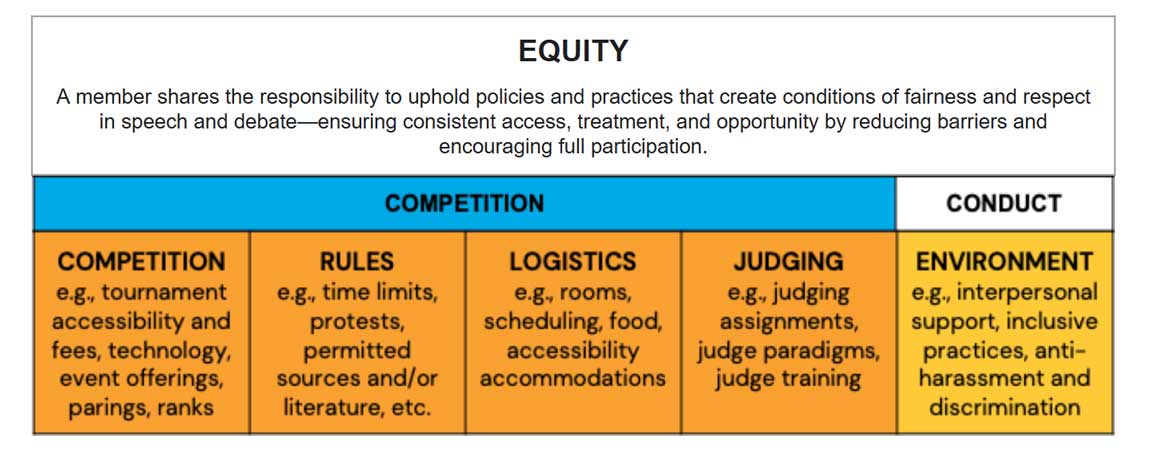
Important Terms and Definitions
Important Terms and Definitions
- Concerned Person The individual who is visiting the BIS to raise a concern.
- Corrective Action(s) designed to improve and/or prevent unwanted or inappropriate behavior.
- Discrimination The act of treating someone less favorably based on characteristics such as race, color, national origin, sex, disability, age, or religion.
- Harassment Unwelcome conduct determined by a reasonable person to be so severe, pervasive, and objectively offensive that it effectively denies the recipient equal access to participation in speech and debate.
- Interpersonal Support Caring and supportive interaction with an individual who feels excluded by an element of the tournament or feels emotionally distraught.
- Subject of Concern Someone alleged to have been involved in an incident of prohibited behavior.
Belonging and Inclusion Advocate
Belonging and Inclusion Advocate
The Belonging and Inclusion Advocate (BIA) serves as the primary point of contact for anyone at a tournament who needs support or wishes to report concerns related to harassment, discrimination, or inappropriate conduct.
Whenever possible, BIAs should not serve concurrently as judges, tournament directors, or tab staff, to ensure they remain fully available throughout the event. If this is not feasible, tournament organizers should plan proactively to manage potential conflicts with other responsibilities.
Ideal Qualifications
- Demonstrated commitment to fostering a safe and equitable environment
- Strong interpersonal skills (e.g., active listening, empathy)
- Proficiency in de-escalation and conflict resolution
- Excellent communication and relationship-building skills
- Training in harassment and discrimination prevention, especially within school settings
- Experience working with K–12 students, educators, counseling, or trauma-informed practices
- Familiarity with the Americans with Disabilities Act (ADA) and related accessibility considerations
Intake Process
Note: This section details the intake, inquiry, and resolution process for the BIS at NSDA district and national tournaments. Other tournaments are encouraged to adapt this model as needed. For guidance on responding to harassment or discrimination violations, consult your school district administration.
The following process will be followed when someone seeks support at the BIS:
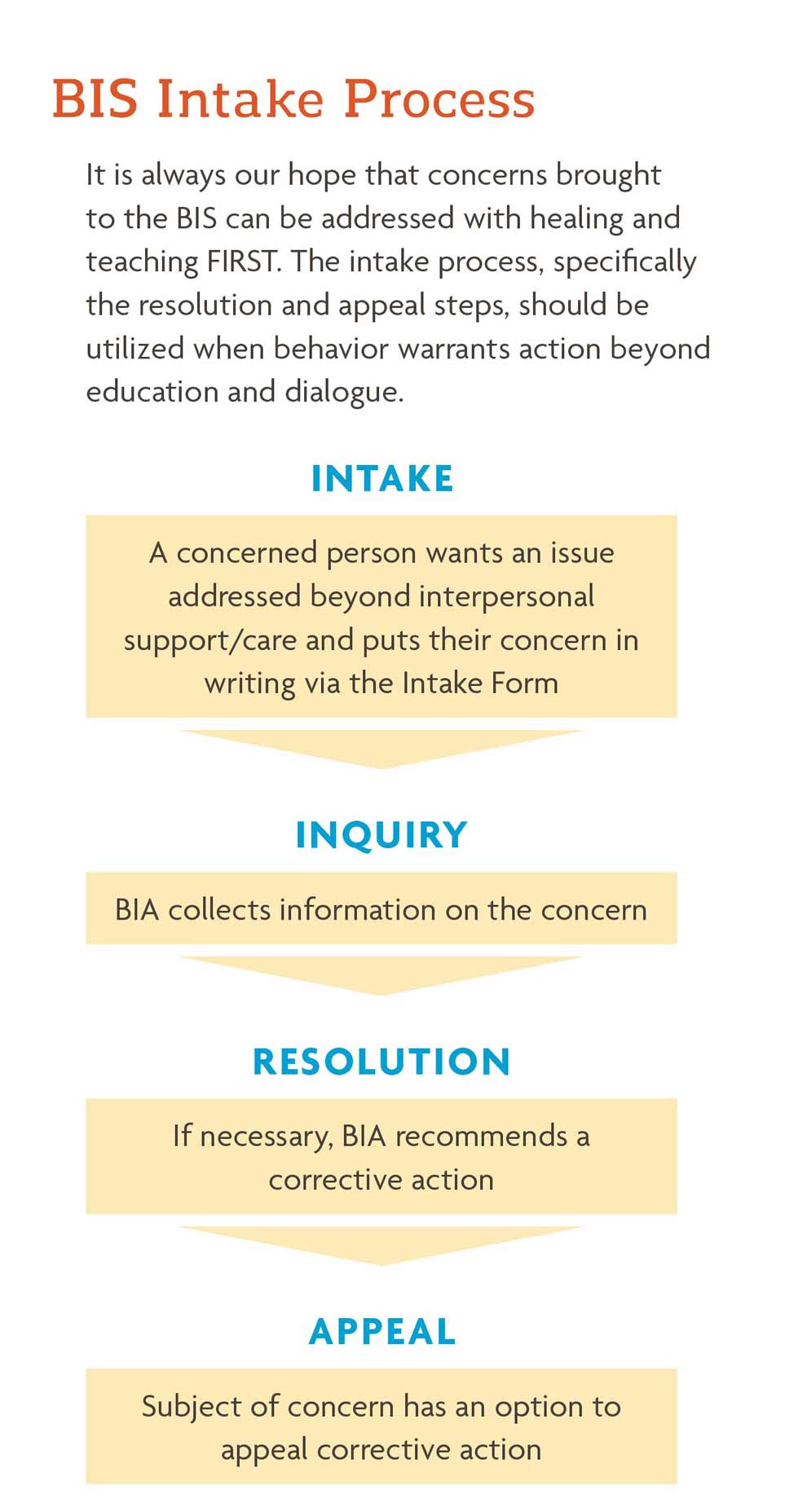
We aim to address BIS concerns through healing and education first. The resolution and appeal process should be used only when behavior requires further action.
Resolution
The BIA attempts to address the concern with education and dialogue. If necessary, the BIA recommends a corrective action.
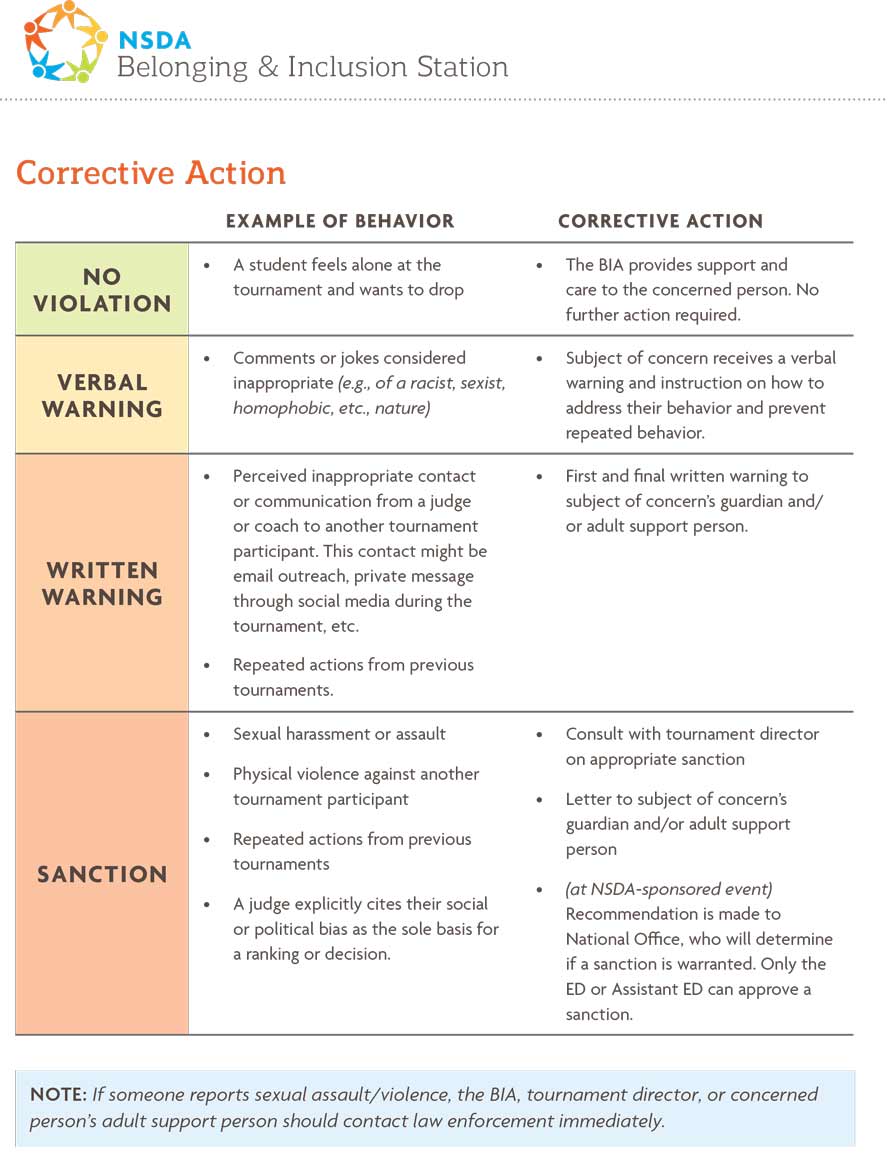
Appeal
If the subject of concern disagrees with the corrective action, they may request an appeal.
- For decisions made during the tournament, appeals should be submitted in writing (including virtually) to the tournament director as soon as possible, who will review and respond within a reasonable time frame.
- For decisions made after the tournament, appeals must also be submitted promptly in writing (including virtually) to the tournament director, who will review and respond within a reasonable time frame.
Note: Any concerning behavior that occurs at an NSDA-sanctioned event (such as the Last Chance Qualifier or the National Speech and Debate Tournament) may be taken into account if similar concerns arise at a future NSDA-sanctioned event. If a Belonging and Inclusion Advocate (BIA) serves at a non-NSDA-sanctioned event, they should consult their respective organization (e.g. state organization) for guidance.
Belonging and Inclusion Station FAQs
Can I go to the BIS if I have a concern but don’t necessarily want someone to get in trouble?
- Yes! The BIS is a supportive space for those who need to be heard. We only use corrective action when a concern cannot be resolved through dialogue and education.
What do I do if I’ve been harassed or discriminated against at the tournament?
- If you’re a student, you should immediately inform an adult, such as your coach, a parent, or the tournament office. If you are a coach, judge, or adult, please go to the tournament office and inform someone that you need to talk to the Belonging and Inclusion Advocate.
If I am a tournament director with a BIS and I don’t want a concerned person to feel forced to tell me the details of their problem, hat’s the best way to determine if they need to visit the BIS?
Ask them if their concern is related to competition or conduct. If it’s a concern about conduct, the BIS is the place to go. If the concern involves both, the tournament director should collaborate with the Belonging and Inclusion Advocate to address and resolve the issues relative to their role.
What happens when I fill out an intake form?
- The Belonging and Inclusion Advocate will gather information from you and others involved in the event(s) that led to your concern. The BIA will ensure you feel heard and supported. After gathering all relevant information, the BIA will determine whether the concern can be addressed through education or if corrective action is needed.
- Note: If the concerned person is a student, the BIA should contact their supervising adult and ask them for help in coordinating a meeting.
What if the concerning behavior happens on the bus to/from the tournament or at the hotel during an overnight stay?
These concerns should be addressed by the supervising adult and/or school administration (if applicable)
Where do I go for a concern that is related to both conduct and competition (e.g., a contestant in your round uses props in Interp and the judge makes inappropriate jokes)?
Go to the tournament office. If the concern involves both competition and conduct, the tournament director should collaborate with the Belonging and Inclusion Advocate to address and resolve the issues relative to their role.
Viewpoint Diversity
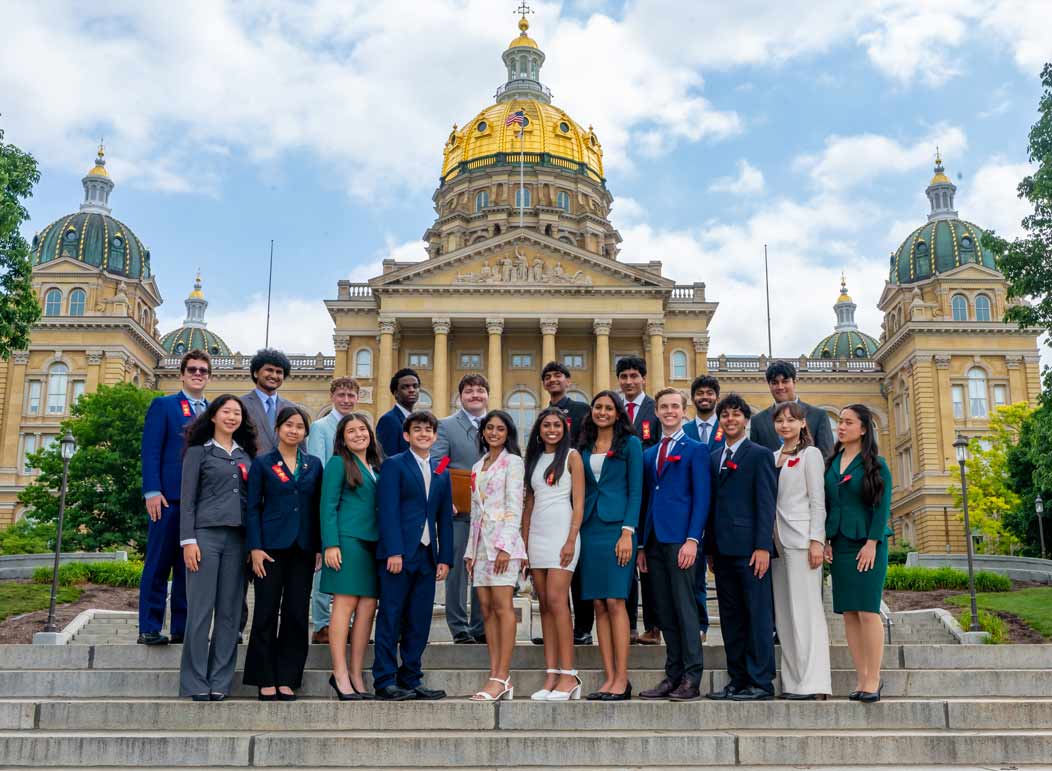
The National Speech & Debate Association believes that every student should have access to speech and debate. We are committed to promoting freedom of expression and celebrating diverse perspectives and ideas from all of our students and coaches.
